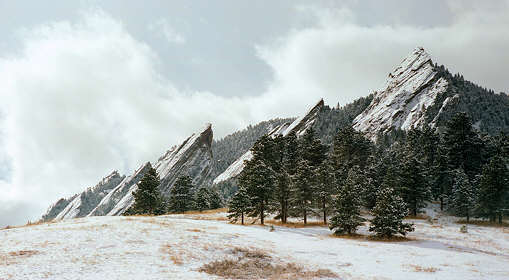At the beginning of my foray into blogging, I mentioned that I was at a conference on land management and policy in the American West hosted by the Center of the American West. The Center and its founder, Dr. Patty Limerick, have worked for the past two plus decades to walk the proverbial "razor's edge" concerning contentious issues in the American West such as water rights and natural gas extraction. After struggling to get our schedules to match for months, I finally got to talk to her about a book she began to write on the history of nuclear technology in the American West.
Well, we sort of got sidetracked.
Dr. Limerick and the Center have begun work on a grant related to the recent controversy over natural gas extraction via the hydraulic fracturing or "fracking" method (no Cylons were involved in the creating of this controversy). As the humanities wing of this grant, the Center has begun to gear up to do what they do best: moderate contentious debates.
One of the things that Dr. Limerick and I talked about during this discussion was how intense these debates can get and how these emotions are expressed not only by "the public", but "rational", and more importantly credentialed scientists. In these cases, being a moderator means not only controlling voices, but learning ways to get them to talk to each other, even if indirectly.
It was interesting that Dr. Limerick expressed the need for moderate voices, because the week before, the Colorado School of Mines Nuclear Engineering program director, Dr. Jeffrey King, expressed a similar need for moderate voices, specifically "Honest Brokers". Honest Brokers are, in essence, individuals who like Dr. Limerick try to expand the range of policy options through fostering discussion and consensus. Honest Brokers don't advocate a particular position, they strive to get policymakers to think about all the options and the consequences of each particular pathway.
Lots of scholars who engage with policymakers talk about this idea of moderation or honest brokering, but never dive into the nitty gritty of how we can have these moderate voices engage in meaningful ways.
 |
| Nuclear Energy Panel at the Western Energy Policy Research Conference (I'm on the right) |
(1) Energy isn't just about economics.
From my own research and talking to other scholars who deal with the societal aspects of energy extraction, I find it very hard to believe that choices concerning energy are a matter of economics alone. Economics does not explain why Naturita residents tied the refurbishment of the Uranium Drive-In sign to the hope that the uranium industry would return to western Colorado. Energy technologies have a certain culture about them, and this culture is reflected in many of the people who interface with the technology on a daily basis.
(2) Scientists are people, too.
This might seem a little silly, but even scientists fall prey to the idea that "science" me and "everyday" me are two different people. Does putting on a lab coat or booting up a process modeling program make you suddenly not, "you"? Of course not. People are always people, and walking the middle road, especially when it comes to energy technologies, means knowing who you are and actively working to keep an open mind. Given the cultural elements of energy technologies, this can be especially difficult.
(3) You are a product of your expertise.
Being a product of your expertise does not mean that you are a mindless automaton that only knows one subject; it means that sometimes you are only viewed through the lens that is your degree. Think about it this way: can you imagine a Petroleum Engineering student who despises oil and natural gas extraction? A Nuclear Engineering student who thinks nuclear power is not a solution to the world's energy needs?
Not easily.
People who carry technology-specific degrees, especially petroleum and nuclear engineers, who are typically equated with O&G and nuclear, respectively, have a hard time convincing others that they are not their degree.
As Dr. King expressed last week, nuclear engineers tend to end up being placed by their peers and the world in general in one of two categories: for or against nuclear power. The problem with this dichotomy is twofold. First, nuclear engineers, like petroleum engineers, and all other engineers, are not a product of their degree. They have the ability to think for themselves and many are quite frankly ambivalent about whether nuclear power is "the solution" or not. Second, this dichotomy makes acting as a Honest Broker when you have or are working on a nuclear engineering degree especially difficult. No one expects a nuclear engineer to provide a moderating voice about Yucca Mountain.
I know this from experience.
Being the moderate voice like Dr. Limerick is not a role you develop overnight. It requires decades of relationship building and open communication with voices on both sides of an issue. Even then, though, you may still have to deal with the reality that people will always view you based on your degree.
You're just a chemist. You're just a sociologist.
 |
| The Decommissioned Rancho Seco Nuclear Power Plant |



No comments:
Post a Comment